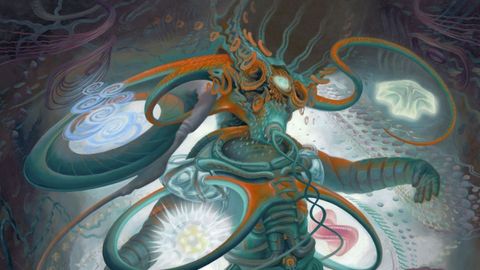If you’re a serious Coheed And Cambria fan, by this point it’s probably the story as much as the music that has you hooked. The latest instalment of singer Claudio Sanchez’s sprawling sci-fi saga The Amory Wars, The Afterman serves as a prequel to the main story arc, which (deep breath) follows Claudio, son of the characters Coheed and Cambria, as he struggles against the tyrannical ruler of the planetary system, Heaven’s Fence. The Afterman’s protagonist, Sirius Amory, lends his name to the epic by virtue of discovering the nature of ‘The Keywork’, the energy that holds the Heaven’s Fence’s 78 planets in alignment (and breathe again).
Predominantly told through the four-part Key Entity Extraction suite and a number of sampled sections bookending the tracks, this first half of The Afterman follows Sirius as he probes the depths of The Keywork. With this new character, and freed of the constraints built up by their five previous canonical records, Sanchez has unusually drawn many of the themes from events in his own life. Consequently on the title track and central suite there’s a general feeling that the compositions are lyrically more approachable than before, even if instrumentally they remain as complex and demanding as ever.
The four Key Entity suites take up much of the running time, with the heavier II: Hollywood The Cracked and III: Vic The Butcher being particular highlights, blending the classic rock of latter-day Zeppelin with a modern progressive rock sensibility. I: Domino The Destitute will be familiar turf to long-time fans, and wears its single status on its sleeve with the same bombast that has defined signature tracks like Welcome Home, from 2005’s Good Apollo, I’m Burning Star IV, Volume One.
For all the fantastical lyrical whimsy, Rich Costey’s production work (Muse, The Mars Volta) enlivens the band’s music, most markedly on the title track. Calling to mind Muse’s Absolution-era B-side Fury, it shares something of their sense of the dramatic as well as a more subtle current of 90s US space-rock. Considering Coheed’s early, alt-rock incarnations and their post-hardcore pedigree, it stands to reason that a good producer would be able to wring such textural experimentation out of them.
The Afterman: Ascension isn’t going to cause any great surprise or upset in terms of style. It’s a natural extension of Coheed And Cambria’s corpus, especially since most of their post-hardcore tendencies have already dissipated. The depth of story and consistent quality here will leave the serious fan clamouring for the conclusion, Descension, due next year.

